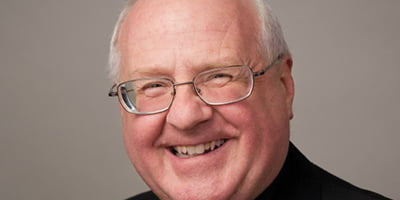
Father Mark Goldasich is the pastor of Sacred Heart parish in Tonganoxie. he has been editor of the Leaven since 1989.
by Father Mark Goldasich
Beware of the two women pictured on the page to the right. They will turn your world upside down.
A couple of months ago, I had lunch with Jan Lewis, the executive director of Catholic Charities. She asked if I’d read a book, which, in her opinion, movingly captured what the church is truly all about. Given her high praise for it, I immediately picked up a copy of the book and, as is typical for me, plopped it on my (towering) “to-read” pile.
Fast forward a few weeks later, when I ran into Kathy O’Hara, the superintendent of archdiocesan schools. She said, “I hope that I’m not going to embarrass myself, but I have a great book for you to read.” Kathy was worried that I’d not only read the book already, but had written a column on it. (I hadn’t and I didn’t.)
Want to guess what the book was? That’s right: the same one that Jan had recommended. Well, I went right home, rummaged in my reading pile and pulled out Gregory Boyle’s “Tattoos on the Heart: The Power of Boundless Compassion” (New York: Free Press, 2010; 217 pgs.; $14).
Wow. All I can say is: Those two women know a good book when they read one. Author Gregory Boyle is actually Father Gregory Boyle, a Jesuit priest who founded and has run Homeboy Industries, a gang-intervention program in Los Angeles for the past 20 years. Known affectionately as G or G-dog by the “homies,” this book provides an unvarnished peek into the brutal world of gangs from someone who lives there. This isn’t a sanitized sociology study, but real stories of real people who have come in and out of G’s life during his time as pastor of Dolores Mission Church, the poorest parish in the Archdiocese of Los Angeles.
The book consists of nine chapters, each filled with brief glimpses of gang members that G has dealt with. From these experiences, the author distills some lessons about the working of God in these often darkest of places.
The reader knows what he or she is in for from the opening few words of the first chapter, where G writes: “God can get tiny, if we’re not careful.” His point is that we often make God into our own image and likeness, rather than the other way around. He writes: “How much greater is the God we have than the one we think we have. . . . [T]he truth of God seems to be about a joy that is a foreigner to disappointment and disapproval.”
If nothing else — and he honestly does so much more — G-dog puts a human face on gang members. If you’ve ever listened to the news of drive-by shootings, for example, and found yourself wondering what would make people act this way, you’ll get some tremendous insights from “Tattoos.”
The God who is found in these pages is not some lofty, saccharine, academic formula. It is an incarnational God: “Jesus was not a man for others. He was one with others. . . . The strategy of Jesus is not centered in taking the right stand on issues, but rather in standing in the right place — with the outcast and those relegated to the margins.”
And that is exactly where G finds himself. There are stories here that will break your heart, make you laugh, depress you, encourage you, and probably even upset you. The language is that of the street, which means that sometimes it will offend delicate ears.
It’s likely that readers will come away with many misconceptions shattered. For instance, I never picture gang members as being primarily teenagers or young adults. Many come from families where parents are nonexistent, addicts of some sort, or suffering from mental illnesses — an “environment that keeps [gang members] unsettled and crazed.”
It was news to me how often gang members cry, that many feel such a “lethal absence of hope” that they “form an exclusive club of young people who plan their funerals and not their futures.”
In fact, at the time of this book’s publication, G-dog had already done the funerals of 168 gang members. I never considered that the bad behavior of “homies” might actually be “the vocabulary of the deeply wounded and of those whose burdens are more than they can bear.”
This is an honest book about steps forward and steps backward. G’s picture of gang members is neither overly simplified nor overly sympathetic, but comes from one who knows his community well and can help those of us who don’t, to widen our perspective and understanding.
Ultimately, Father Boyle wants readers to develop “a compassion that can stand in awe at what the poor have to carry, rather than stand in judgment at how they carry it.”
This is a book for pondering. It’s a challenge and an encouragement to become firme, which means “could not be one bit better.” It is a wise teacher about what faith is ultimately meant to be.
The Christian mystic and social activist Simone Weil reminds us: “Those who are unhappy have no need for anything in this world, but people capable of giving them their attention.”
Simply taking the time to read “Tattoos” would be a great step in that direction.

